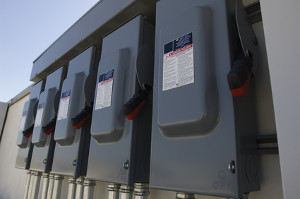What Makes a Circuit Breaker Trip in Seattle?

When you have circuit breaker trip in your Seattle home, you have to get your electricity working again by going outside, out to the garage, or down to your basement to flip the breaker back on. And if this becomes a recurring problem, it doesn’t take long for it to get extremely frustrating. More importantly, frequently tripping circuit breakers can signify very dangerous electric problems.
So why is this happening? The professionals at NW Electricians Today have broken it down for you.
What is “Tripping”?
Seattle Circuit breakers trip in order to cut off the flow of electricity in order to keep the circuits from overheating, which could cause a lot of damage. If circuit breakers didn’t trip, house fires would be a much more common problem.
Before you go back out to turn the breaker switch back on again, it’s important to consider why your breaker tripped in the first place. The three most common reasons a circuit breaker trips are:
- Short Circuits
- Overloaded Circuits
- Ground Fault Surges Here is a quick look at what those terms mean for you, what they mean to your Seattle home, and what you can do to prevent further damage:
Circuit Overload
The number one of cause tripping circuit breakers is overloaded circuits. This means that you’re asking a particular circuit to provide more electricity to your home that is has the capacity for. When this happens, it causes the circuit to overheat.
If you’re running a computer and a television through the same circuit, using 20 amps of electricity in a circuit that was meant to run 15 amps, the circuit breaker trips to prevent the circuit from possibly overheating and catching fire.
There are a couple of solutions to this problem. The first is to redistribute your devices and keep them off of the same circuits. You could also turn some of the devices off to reduce the electrical load.
Short Circuits
Another common cause of breakers tripping is a short circuit, which is much more dangerous to your Seattle home than an overloaded circuit.
A short circuit occurs when a “hot” wire comes into contact with a “neutral wire” in one of your outlets. When this happens, there is a huge amount of electrical current flowing, which creates more heat than the circuit can handle. Again, the circuit shuts off to prevent any dangerous outcomes.
You should be able to easily recognize whether a short circuit has occurred in your Seattle home because a smell of burning will be left around the breaker. You may also find a dark brown or black discoloration around the breaker. There are a number of reasons that these wires could be crossing, and it could just be loose connections or faulty wiring—either way, you should have the problem looked at by a professional Seattle electrician as soon as possible.
Ground Fault Surges
Ground fault surges are actually very similar to short circuits.
A ground fault happens when a hot wire touches a ground wire, or when the side of a metal outlet box is connected to the ground wire. You should be able to see the same discoloration around your outlet you would after a short circuit if a ground fault surge has occurred.
Any of these problems have the potential to become very dangerous if they’re recurring, so if you’re breakers are tripping frequently, it’s worth calling a professional electrician for a safety inspection.











